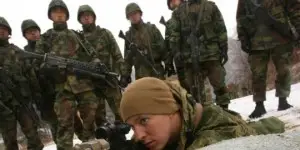Post nuclear test by North Korea, neighbouring countries deploy forces
(Courtesy: Dainik Pratyaksha)
Japan and South Korea have started the build-up of their troops on their respective borders after North Korea conducted its third nuclear test, defying international pressure. A team of scientists from South Korea has also been deployed to investigate the nature of the nuclear test. South Korea has hinted at development of a long range ballistic missile, to give a befitting reply to North Korea.
Although North Korea has not provided detailed information on these tests, South Korean military analysts and scientists are trying to ascertain the details. Even though the tests carried out by North Korea on Tuesday are believed to be of lower intensity, they are still believed to be 7 to 8 times more powerful than those conducted in 2006 and 2009. Military analysts believe that these nukes are enough to target the US. While providing information about the tests, North Korea has declared testing of a ‘light weight but potentially more destructive explosive device’. These tests are believed to be a warning from North Korea to the US.
North Korea has also warned that it may be forced to take the second and the third step as well. A concerned South Korea believes that North Korea may be contemplating conducting another nuclear test, as well as a missile test. In response to the warnings given by North Korea, South Korea has also warned of developing a ballistic missile with a range of 800 kilometres. South Korea’s Defence ministry spokesman, Kim Min-Seok, has declared the development of ballistic missiles capable of targeting all the cities of North Korea. There has also been an increase in the movements of the South Korean troops near the border.
Japan has also kept its army, navy and air-force in a state of readiness, to face any unprovoked aggression. It was just in the week before, that the Supreme Leader of North Korea Kim Jong-un had given orders to his military, to be ready for a full fledged war. This has created a war-like situation in the Korean peninsula. In the meanwhile, China has also turned its back on North Korea. Following the North Korean nuclear tests, China had summoned North Korea’s ambassador in Beijing for a dressing down. Criticizing the nuclear tests, the UK had also summoned the North Korean ambassador.
In the meanwhile, there has been considerable increase in tensions in the region. The US and South Korea are in the midst of one of their biggest war exercises in South Korea, named ‘Foal Eagle’. South Korea, with its two lakh forces and the US with its ten thousand troops, along with an aircraft carrier, F-22 stealth fighter aircrafts and B-52 strategic bomber jets are participating in this war exercise, which is seen as serious warning to North Korea. As if in reply to this, North Korea too is conducting its own war exercise, which includes its forces from the Army, Air Force and Navy. North Korea has also hinted at conducting more missile tests. South Korean sources have reported the scale of these war games held by North Korea as the first and largest of its kind. Tensions are running so high that it is feared that these war exercises, conducted by both sides, may snowball into a major conflict in the region.
At the same time, differences between China and North Korea are coming to the fore. A US official has recently declared that the US and China have reached consensus on imposing sanctions against North Korea. At this very time, there has been considerable decrease in exports from China to North Korea.
In the meantime, North Korea has threatened to launch pre-emptive nuclear attacks on the US and South Korea with short and medium range nuclear weapons. Replying to this threat, South Korea has warned North Korea to refrain from any kind of provocation, failing which South Korea would target the North Korean leadership.
In a series of developments over the last few days, North Korea has threatened to launch missile attacks on South Korea’s Yeonpyeong island and warned its inhabitants to evacuate the island if they fear for their lives. It has also voiced its objections to the announcement of bolstering its missile defence shield, made by US Secretary of Defence, Chuck Hagel in response to what he referred to as “irresponsible and reckless provocations” of carrying out a pre-emptive nuclear strike against the US. But North Korea has blamed this as military pressure tactic of the US.
North Korea has asserted that it will not allow itself to be forced into any kind of negotiations on the issue of nuclear weapons in the face of any threat of US aggression. North Korea has stated that its nuclear weapons are for self-defence and not for negotiations. It has refused to enter into any kind of peace talks with the US unless there is a change in its the anti-North Korea stance.
Criticizing the tour of South Korean Prime Minister, Jung Hong-won to the Yeonpyeong island, North Korea has renewed its threat of carrying out missile attacks on the island. There is a distinct possibility that a war could flare-up anytime between the two countries because of the military exercises conducted South Korea jointly with the US forces.
It may be recalled that North Korea had rained missiles on these very islands during the year 2010. The attacks had resulted in death of four South Korean nationals. Last year, North Korea had also warned President of South Korea, Lee Myung-bak after he had visited the Yeonpyeong islands. But the recent threats issued by North Korea are looked upon seriously. It is also said that the US has also been taking these threats seriously.
Published at Mumbai, Maharashtra - India



